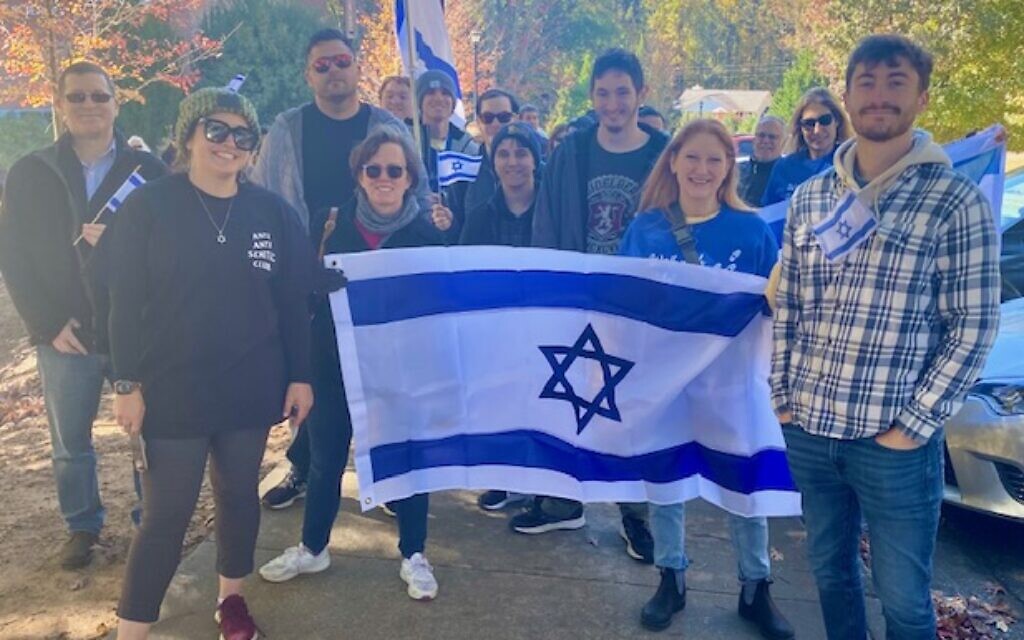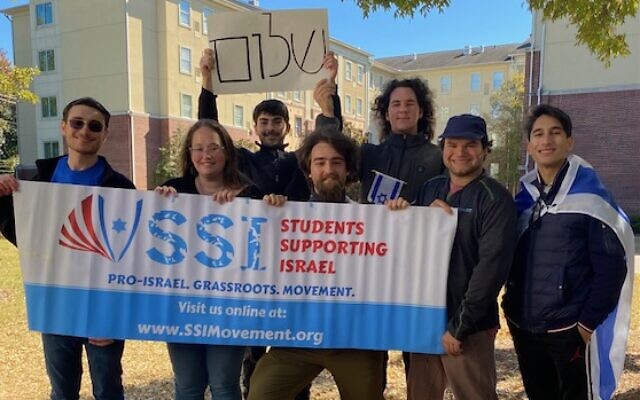Georgia’s Colleges Not Immune from Antisemitism
In a powerful show of unity and support for Jewish university students here in Georgia, Hillels of Georgia recently held walks on seven university campuses across the state.
College campuses in Georgia are not immune to the antisemitism that has spread throughout American universities since the Oct. 7 attacks in Israel and subsequent Israel-Gaza conflict.
Leaders of several Jewish organizations, including Hillels of Georgia and the Atlanta Israel Coalition, believe Students for Justice in Palestine (SJP) is the galvanizing force behind much of the hate speech and aggression currently directed toward Jewish students. At the University of Georgia, a Jewish student was assaulted by another student said to be loosely affiliated with the organization.
The student was arrested and received misdemeanor battery charges but was released from custody shortly after his arrest.
In a powerful show of unity and support for Jewish university students here in Georgia, Hillels of Georgia recently held walks on seven university campuses across the state. Students, parents, allies, and other supporters walked at Emory University, Georgia State University, Georgia Tech, Kennesaw State University, University of Georgia, Georgia Southern University, and Savannah College of Art & Design.
Hillel scheduled the walks in part to convey to university leadership that they must do more to protect Jewish students. Hillel leadership believes the communal gatherings will also help deter others who may think they can attack Jews with impunity.
At Emory University, more than 300 students and supporters participated in the walk. At the University of Georgia, 150 people walked, and more than 100 supporters participated at Georgia Tech and Kennesaw State. At the schools with fewer Jewish students, the walks were smaller, but attended by both students and community members.
“Our students should be free to walk around campus without harassment or fear they will encounter unprovoked aggression,” said Rabbi Larry Sernovitz, chief executive officer of Hillels of Georgia. “We would like to see the universities be more proactive in developing strategies to combat antisemitism,” added Sernovitz.

To date, none of the colleges in Georgia have reached out to their campus Hillel asking for help in creating an initiative or strategies to deal with on-campus antisemitism. Rabbi Sernovitz mentioned SJP protests at Emory University and the University of Georgia calling for Jewish genocide.
He also mentioned an incident at Georgia Tech targeting the AEPi house. Someone wrote “Free Palestine” in shaving cream under a banner the fraternity had hung stating, “Stands with Israel.” The incident remains under investigation. More recently, prior to Halloween, posters were hung at Kennesaw State with a photo of Israeli Prime Minister Benjamin Netanyahu and the verbiage, “Horror of Israel.”
Earlier this year, state lawmakers rejected HB 30, which would have adopted into state law the International Holocaust Remembrance Alliance working definition of antisemitism which explains it as a “certain perception of Jews, which may be expressed as hatred toward Jews. Rhetorical and physical manifestations of antisemitism are directed toward Jewish or non-Jewish individuals and/or their property, toward Jewish community institutions and religious facilities.” It also provides a list of operational examples of this definition, one being “accusing Jews as a people of responsible for real or imagined wrongdoing committed by a single Jewish person or group, or even for acts committed by non-Jews.”
The U.S. Department of State currently uses this working definition in investigating incidents of antisemitism. Included in the definition is the “targeting of the state of Israel,” although the Alliance specifically states that “criticism of Israel similar to that leveled against any other country cannot be regarded as antisemitic.” The passage of the bill would have made an assault or illegal action against a Jewish person based on their religion a hate crime, punishable as a felony.
Sernovitz would like to see university officials across the board take a stronger stance when it comes to the antisemitism and anti-Israel rhetoric. He believes there is a lack of understanding by many university administrators, although he stressed that campus police have been extremely supportive in ensuring the safety of Jewish students. To date, Sonny Perdue, Chancellor of the University System of Georgia, has not issued a statement regarding antisemitism on Georgia campuses, leaving it up to individual university presidents, though he has urged university administrators to enhance on-campus security.
Part of the problem on Georgia’s campuses, according to Sernovitz, is that the Diversity, Equity and Inclusion movement does not typically recognize Jewish people as a protected group. Although the campus offices were created to foster recognition and respect for human differences and avoid marginalizing any group, Jewish people are often excluded from these protections in practice.
Sernovitz would like to see university officials across the board take a stronger stance when it comes to the antisemitism and anti-Israel rhetoric. He believes there is a lack of understanding by many university administrators, although he stressed that campus police have been extremely supportive in ensuring the safety of Jewish students.
Cheryl Dorchinsky, executive director of Atlanta Israel Coalition, is also concerned about the challenges facing Jewish students on Georgia’s college campuses. Dorchinsky, who participated in the walk at Kennesaw State, finds Jewish Voice for Peace and IfNotNow, two anti-Zionist groups, especially troubling. Jewish Voice for Peace identifies itself as the “largest progressive Jewish anti-Zionist organization in the world” on its website. The group was responsible for the protest shutting down Grand Central Station in New York and recently sponsored a protest at Atlanta’s Woodruff Park.
According to an onlooker, a representative of Jewish Voice for Peace wrestled an Israeli flag from a woman and videotaped her as she tried to get it back, framing her as the aggressor. The woman had just lost her cousin in the terrorist attack in Southern Israel.
“Jewish Voice for Peace aligns themselves with those who want to eradicate Israel, spreads hate and misinformation, and misrepresents themselves here as Atlanta’s Jewish voice. They are actively recruiting college students, trying to organize Shabbat dinners and meetings under the guise of being ‘progressive,’” said Dorchinsky.
Amidst the chaos, groups like Hillel and Chabad are reaching out to engage students via Shabbat dinners, lectures, and vigils. “We are trying to balance safety and protection while building a vibrant Jewish life on each of these campuses,” said Rabbi Sernovitz.
Sernovitz recommends that prospective students and their parents take a thorough look at each college they are considering and do their research. First, they should determine if there is support of Jewish life on campus. Next, they should research any incidents of hate on the campus and take into consideration how the school administrators have responded.
The Jewish community at large can augment Hillel’s efforts, according to Servovitz, by leveraging their relationships with government officials, the private sector, and contacts at universities. Hillels of Georgia plans to continue offering Israel advocacy training, mental health support, Shabbat dinners and a full calendar of events and speakers at each Georgia campus. To support their efforts and donate, please visit www.hillelsofgeorgia.com.
- News
- Local
- Debbie Diamond
- israel-gaza conflict
- Hillels of Georgia
- Atlanta Israel Coalition
- Students for Justice in Palestine
- University of Georgia
- Emory University
- Georgia state university
- Georgia Tech
- Kennesaw State University
- Georgia Southern University
- Savannah College of Art & Design
- Rabbi Larry Sernovitz
- aepi
- Benjamin Netanyahu
- International Holocaust Remembrance Alliance
- HB 30
- Sonny Perdue
- Diversity
- Equity and Inclusion
- Cheryl Dorchinsky
- Jewish Voice for Peace
- IfNotNow




comments